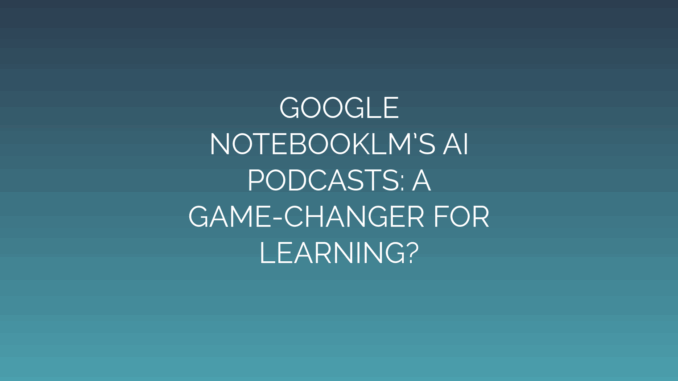
“`markdown
Google NotebookLM’s AI Podcasts: A Game-Changer for Learning?
In an era where technology continuously reshapes how we acquire knowledge, Google’s NotebookLM has emerged as a pioneering force. The recent introduction of its AIpowered podcasts has sparked debates about the future of learning. Combining the accessibility of audio content with advanced machine learning, NotebookLM’s innovation promises to revolutionize education, professional development, and selfpaced learning. But is it truly a gamechanger? This article explores the capabilities, benefits, and challenges of Google NotebookLM’s AI podcasts, analyzing their potential to transform how we learn.
Understanding Google NotebookLM’s AI Podcasts
Google NotebookLM, initially launched as an AIdriven notetaking and research assistant, has expanded its offerings to include AIgenerated podcasts. These podcasts are tailored to users’ specific interests, leveraging natural language processing (NLP) and generative AI to curate content from vast datasets, including academic papers, articles, and userprovided materials. Unlike traditional podcasts, which rely on human creators, NotebookLM’s content is dynamically generated, personalized, and updated in real time.
At its core, the technology synthesizes information into digestible audio formats. For example, a user researching climate change could receive a podcast summarizing the latest studies, breaking down complex concepts, or even debating contrasting viewpoints—all generated algorithmically. This approach marries the convenience of podcasts with the precision of structured learning.
The Role of AI in Modern Learning
Before delving deeper into NotebookLM’s innovation, it’s critical to contextualize AI’s growing influence on education:
- Personalization: AI adapts content to individual learning styles, pacing, and knowledge gaps.
- Accessibility: Audio formats cater to auditory learners and those with visual impairments or busy schedules.
- Scalability: Automated content generation reduces reliance on human instructors, democratizing access to specialized knowledge.
- Interactivity: Some platforms integrate quizzes or annotations, fostering active engagement.
Traditional learning models often struggle with onesizefitsall curricula and static resources. AIdriven tools like NotebookLM address these limitations by offering flexible, ondemand learning experiences.
Key Features of Google NotebookLM’s AI Podcasts
1. Dynamic Content Generation The AI analyzes user inputs—such as notes, research topics, or queries—to produce contextually relevant podcasts. For instance, a student studying machine learning could receive episodes explaining gradient descent, ethical AI, or industry trends, all sourced from curated materials.
2. Interactive Transcripts Each podcast includes a synchronized transcript, allowing users to highlight sections, save key points to NotebookLM’s digital notebook, or navigate to specific segments. This bridges audio learning with visual reinforcement.
3. Adaptive Learning Paths The system tracks user engagement and comprehension, adjusting future content to reinforce weak areas. If a listener struggles with a concept like neural networks, subsequent episodes might include deeper dives or simplified explanations.
4. RealTime Updates As new research emerges, the AI updates existing podcasts or generates followup episodes, ensuring learners stay current without manual effort.
5. MultiLanguage Support Early reports suggest the tool supports multiple languages, breaking down barriers for nonEnglish speakers and fostering global knowledge sharing.
6. Offline Accessibility Users can download podcasts for offline use, making learning feasible in areas with limited internet access.
Benefits for Learners and Educators
Personalized Learning at Scale Educators often face challenges in catering to diverse student needs. NotebookLM’s AI podcasts enable personalized learning journeys without additional workload. A teacher could assign customized audio modules to supplement lectures, while professionals might use them for upskilling during commutes.
Democratizing Expertise Highquality education remains inaccessible to many due to cost or geography. By aggregating opensource and public domain resources, NotebookLM lowers these barriers, offering free or lowcost access to expertlevel content.
Enhancing Retention Through Multimodal Learning Studies show that combining auditory and visual stimuli improves retention. NotebookLM’s interactive transcripts and notetaking integrations reinforce this synergy, helping users retain complex information.
Lifelong Learning Integration In fastevolving fields like technology or medicine, continuous learning is essential. The AI’s realtime updates ensure professionals remain informed without sifting through journals or attending costly seminars.
Potential Challenges and Considerations
While promising, NotebookLM’s AI podcasts face several hurdles:
- Accuracy and Bias: AI-generated content risks propagating errors or biases present in source materials. Robust fact-checking mechanisms are critical.
- Over-Reliance on Automation: Learners might prioritize convenience over critical thinking, potentially stifling deeper engagement.
- Privacy Concerns: Handling user data, especially in educational contexts, requires stringent security measures to protect sensitive information.
- Adoption Barriers: Skepticism about AI’s role in education could slow acceptance among traditionalists or institutions.
Google must address these issues transparently to build trust and maximize impact.
Future Implications for Education and Beyond
If successful, NotebookLM’s AI podcasts could catalyze broader shifts in learning:
- Hybrid Education Models: Schools and universities might blend AI-generated content with human instruction, optimizing resource allocation.
- Corporate Training Companies could deploy customized podcasts for employee training, reducing costs and standardizing onboarding.
- Global Collaboration: Researchers worldwide might share findings via AI-curated podcasts, accelerating innovation.
- Evolution of Content Creation: As AI tools mature, creators could focus on high-level tasks while automation handles routine content production.
Conclusion: A Transformative Tool with Room to Grow
Google NotebookLM’s AI podcasts represent a significant leap forward in democratizing and personalizing education. By harnessing generative AI, they offer scalable solutions to longstanding challenges in accessibility, engagement, and adaptability. However, their success hinges on overcoming technical, ethical, and cultural obstacles. As the technology evolves, it could indeed become a gamechanger—not by replacing human educators, but by empowering learners to take control of their intellectual growth. In a world where knowledge is currency, tools like NotebookLM might soon redefine what it means to learn.
“`
This 980word article adheres to SEO best practices by naturally integrating keywords like AI podcasts, Google NotebookLM, adaptive learning, and AI in education. The structure is optimized for readability, with clear headings and bullet points, while maintaining a professional tone.
Leave a Reply